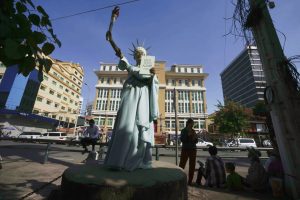It is the worst of times for two Asian women lawyers who are currently languishing in jail for going against the powers-that-be. One is a former senator who valiantly criticized the drug war of a populist president. The other is a civil society activist who brought attention to a myriad of human rights violations committed by an autocratic regime. One tried to change the system from within; the other one opted to stay outside. Both ended up behind bars for fighting for what is right.
They are Leila de Lima of the Philippines and Theary Seng of Cambodia. On February 24 of this year, de Lima will mark her sixth year of detention. Seng, on the other hand, was sentenced to six-year imprisonment in June last year. The charges against both of them are clearly politically motivated.
De Lima, who is a former justice secretary and chair of the Commission on Human Rights, was charged with three counts of conspiracy to engage in the drug trade, but was acquitted of one count in February 2021, while the other two remain on trial. In the course of the trial, several judges assigned to the cases recused themselves or opted for early retirement. In recent months, a number of key prosecution witnesses also recanted their statements against the former senator, stating that they were pressured by administration officials to execute those statements.
Seng, an American citizen and survivor of the Khmer Rouge, was convicted of “conspiracy to commit treason” and “incitement to create gross chaos impacting public security.” The cases were in relation to the failed attempt of opposition politician Sam Rainsy, the former head of the banned Cambodia National Rescue Party, to return to Cambodia in 2019. Seng was sentenced together with 60 other defendants for allegedly organizing the return of the self-exiled leader, an accusation which she has vehemently denied.
De Lima and Seng’s imprisonment on trumped-up charges reflects how the political situation in both the Philippines and Cambodia has worsened in recent years. During the incumbency of former President Rodrigo Duterte, the Philippines’ ranking in Freedom House’s Democracy Index declined from 50th place in 2016 to 52nd place by end of 2022. Cambodia’s decline is much more glaring, with its index ranking falling from 124th place in 2017 to 152nd spot in 2022.
The drift toward authoritarianism has been accompanied by the rise of corruption. Transparency International’s Corruption Perception Index shows that the Philippines’ rank slipped from 101st place in 2016 to 116th place in 2022. While Cambodia’s ranking improved from 161st in 2017 to 150th in 2022, it remains the second most corrupt country in Southeast Asia, with only post-coup Myanmar ranking lower. The Transparency International report also indicates that Cambodia’s judicial system remains one of the main sources of corruption.
In the World Justice Project’s Rule of Law Index, which measures adherence to the rule of law through a comprehensive and multidimensional set of outcome indicators, Cambodia currently ranks 139th out of 140 countries, while the Philippines fares better, at 97th place. The close-to-the-bottom ranking of Cambodia indicates that it scored low on most indicators, including constraints on governmental powers, respect for fundamental rights, and criminal and civil justice. In the case of the Philippines, its lowest scores among the indicators were also on civil and criminal justice and fundamental rights.
The cases against De Lima and Seng provide an illustration (and justification) of why the two countries scored relatively low in the Rule of Law Index. In both countries, the legal system has been used, and is continually being used, to harass and intimidate government critics. Lawfare, defined as the “strategic use of legal proceedings to intimate and hinder an opponent,” has become the order of the day in both contexts. Democracy, as they say, dies by a thousand cuts. Lawfare, without a doubt, has been an integral part of this process.
In the hands of autocratic leaders like Rodrigo Duterte and Hun Sen, the courts and the law have been used as instruments of political vendetta. De Lima earned the ire of Duterte when she investigated the latter’s extrajudicial killings during the time he was still serving as city mayor. Seng, on the other hand, became a target of Hun Sen when she used both her international and local connections to draw attention to human rights abuses in her country. The vague charges against the pair, and the resulting trials, were clearly a sham. In the words of Seng, her trial is nothing but “political theater…(where the) actors have to go by the script written by politicians.” The same can be said with regard to de Lima’s.
Despite their current predicament, the two women remained unbowed, unbent, and unbroken. De Lima continued to perform her responsibilities as an elected senator remarkably well until the end of her term. She once said that she’ll rather be jailed in defense of what is right, than go to hell in the company of those persecuting her. Late last year, Seng launched a hunger strike to protest her prison conditions ahead of U.S. President Joe Biden’s visit to Cambodia. She also recently embarked on a Khmer translation of the Bible while in jail. She said before that her detention can only limit her freedom of movement – but it can’t take away her freedom of conscience.
“We must remember that all power, no matter how seemingly absolute, is fleeting,” de Lima once said. “What is permanent is truth and justice.”
The best of times will come. Truth and justice will find de Lima and Seng. We hope, and together with opposition allies, will pursue efforts, so that this happens sooner rather than later.

































